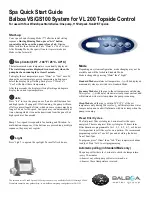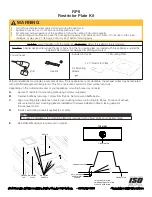
Physical Pendulum Accessory
Model No. ME-9858
6
®
Taking Measurements and Collecting Data
Part I: Measure and Adjust the Mass of the Car
1.
Release the car from halfway up the hill and carefully watch the collision. If the car has no
added masses, it will rebound off of the pendulum, and thus be moving "backwards" after the
collision. If the ballast mass was added, the car would continue in the forward direction after
the collision. (Here is a good reason to use the catcher at the end of the track as a safety stop.)
CAUTION:
Catch the pendulum before it swings back down! Don't let it swing down
and hit the car!
2.
With the small screw provided with the car, secure the
small masses in the tray on top of the bumper (Figure 4.)
3.
Using the small masses provided, adjust the mass of the
car so that after the collision, the car is neither moving
forwards or backwards. The car should stop completely,
so that its velocity after the collision is zero. The mass
needed to do this is independent of the speed of the car,
but if the car is moving too slowly, friction will stop the
car any way. Start the car at least half way up the hill
during this part of the experiment.
4.
After adding the proper amount of mass, weigh the mass of the entire car (m
o
).
Part II: Record the Pendulum’s Mass,
Length, and Radius
1.
Find the pendulum's mass (M). (Note: This
does
not
include the pivot support rod.)
2.
Measure the length (
l
) of the brass part of the
pendulum. Do
not
include the bumper pin.
3.
Measure the distance (d) from the center of the
pivot pin to the top end of the pendulum (the
non-pin end) (See Figure 5).
4.
With the pendulum on the support pivot, and
the car's bumper against bumper pin, measure
the distance (
r
) from the center pivot pin out to
the position of the rubber bands on the car
bumper. This is the radius at which the car applies a force (and thus a torque) to the
pendulum, causing it to rotate. Note: Because of the bumper pin,
l
=d+r.
mass
screw
Figure 4: Mass in Car
pivot
rubber
d
r
band
bumper
Figure 5
l































